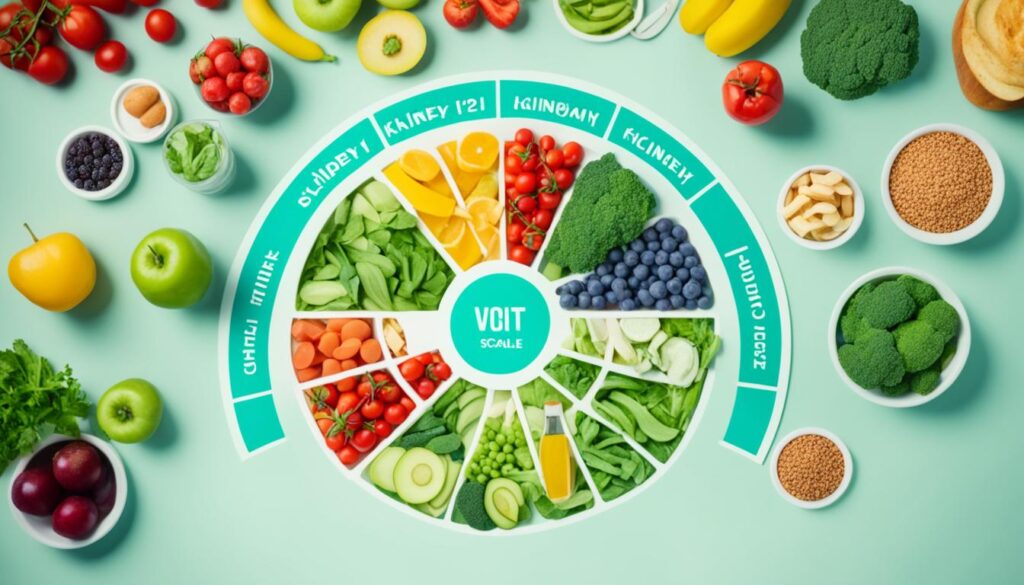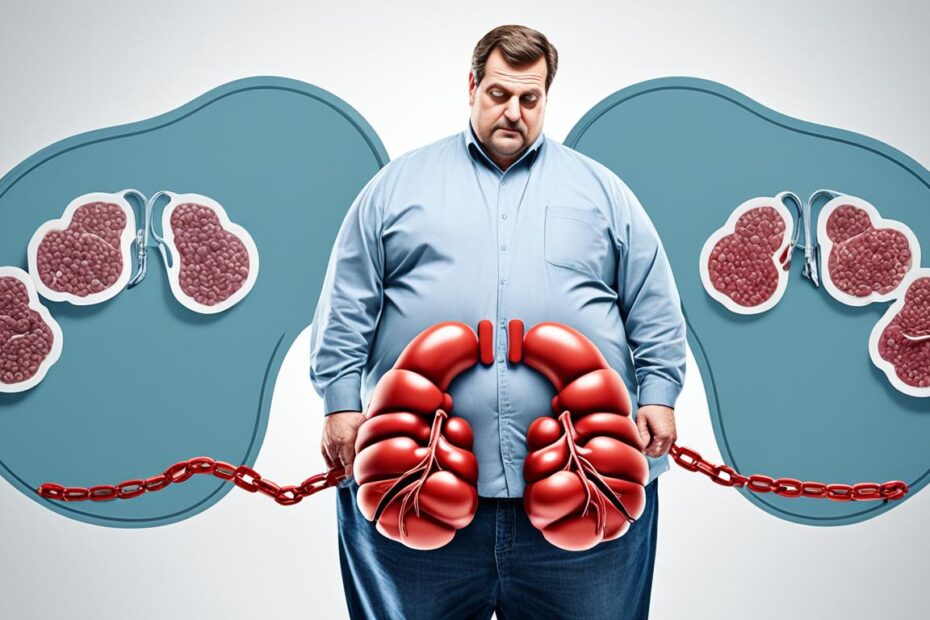Weight and kidney health are linked. Millions have chronic kidney disease. It’s key to know if losing weight helps kidneys.
The answer is tricky. Obesity can hurt kidneys. But, in kidney patients, weight can be from keeping too much fluid. So, they might not really be gaining fat. Chronic kidney disease causes fast, odd weight changes.
Keep your weight in check for healthy kidneys. Obesity makes diabetes and high blood pressure more likely. Both are big causes of kidney trouble. But, it’s not just about shedding pounds. A better lifestyle helps kidneys too.
This guide will explore weight loss and kidneys. We’ll cover studies, safe ways to lose weight, and kidney benefits over time. It’s helpful for anyone caring for their kidneys. Or, those who want to keep them healthy.
Understanding Chronic Kidney Disease and Obesity
The link between obesity and kidney health is a big worry. Obesity is rising, and so are cases of chronic kidney disease (CKD). Let’s look at how this link affects our kidneys.
The Link Between Obesity and Kidney Disease
Being too heavy can harm your kidneys. It can cause high blood pressure and diabetes, leading to CKD. These issues mess up your kidney’s job of cleaning your blood.
How Excess Weight Affects Kidney Function
More weight makes your kidneys work harder. This might lower your glomerular filtration rate, an important kidney health sign. Obesity may also make protein leak into your urine. This can hurt your kidneys as time goes on.
Risk Factors for Chronic Kidney Disease
There are many things that could up your CKD risk:
- Family history of kidney problems
- Hypertension (high blood pressure)
- Diabetes
- Obesity, especially around your waist
If you’re shaped like an apple, with extra weight at the middle, your risks are higher. Keeping a healthy weight is key to protecting your kidneys and health.
The Impact of Weight Loss on Kidney Health

Losing weight helps your kidneys. It makes them work better. Even a little weight loss improves how your kidneys filter things.
Obesity and diabetes are big problems worldwide. Over 529 million people have diabetes. Most adults with diabetes are also overweight.
Here’s how losing weight helps your kidneys:
- It makes your blood pressure better.
- It helps control blood sugar.
- It lowers protein in your pee.
- It decreases your risk of kidney disease.
Just dropping 10 pounds makes your blood pressure and diabetes risk go down. That’s good for your kidneys. Bariatric surgery studies found it helps protect the kidneys too.
If you have kidney issues, be careful with fast weight loss. Going slow is safer for your kidneys. Talk to your doctor before you start any weight loss plan if you’re worried about your kidneys.
Can Weight Loss Improve Kidney Function?
I’ve been looking into how losing weight connects to kidney health. Some surprising info I found out matched a study from Obesity. This study showed interesting things about obesity and chronic kidney disease.
Research Findings on Weight Loss and Kidney Function
This study says that keeping our weight stable could help our kidneys the most. If you gain 11 pounds, your risk of kidney disease goes up by 34%. So, stopping weight gain is key.
The Role of Physical Fitness in Kidney Health
Getting fit really helps our kidneys. Here’s what the study showed:
- Slow walkers (less than 2 miles per hour) were 57% more likely to get kidney disease
- Fast walkers had a 36% lower risk of dying over 7 years
- Building muscle might help slow walkers to walk faster

Prevention vs. Treatment: Weight Maintenance or Weight Loss
The research says it’s better not to gain weight for your kidneys. But, if you are already obese, keeping weight off and moving more helps. Exercise is always good, even if you don’t lose weight. It can reduce risks from having a high body mass index and boost your kidney health.
Safe Weight Loss Strategies for Kidney Patients
Weight management can be hard with chronic kidney disease. But there are safe ways to lose weight. You can protect your kidneys while doing so.
Eating the right foods is very important. I choose foods that are whole and full of nutrients. For veggies, I pick low-potassium ones like iceberg lettuce and cucumbers. For fruits, I eat apples, mandarin oranges, and grapes. Using these foods helps me stay at a healthy weight without hurting my kidneys.
Controlling how much you eat is key. It’s easy to eat more than we think. To help, I measure my food and check nutrition labels. Trying to eat 500-1,000 fewer calories each day is a good start. This can help me lose 1-2 pounds safely every week.
Moving your body is also important. I work out for 30 minutes, five days a week. I do exercises that aren’t too hard. This can help my blood pressure and keeps my muscles strong. I also do some light weight training.
Telling friends and family about my weight loss efforts keeps me going. Even if I don’t see change on the scale, I know these healthy choices are good for me. Always remember, steady weight loss is key for people with kidney disease.
Always talk to your doctor or a diet expert before trying anything new. They will help make a plan just for you. This way, you can be sure you’re losing weight in a way that’s good for your kidneys.
The Importance of Exercise in Kidney Health and Weight Management
Exercise is key for keeping your kidneys healthy and managing weight when you have chronic kidney disease. We’ll look at why staying active is so good for you. Also, I’ll give you tips on the best exercises for kidney patients.
Benefits of Regular Physical Activity
Working out regularly has many pluses for people with chronic kidney disease:
- Improves heart health
- Helps kidneys work better
- Makes it easier to manage your weight
- Gives you more energy
- Makes you feel better overall
Types of Exercises Suitable for Kidney Patients
For the best physical health, you should mix aerobic and strength training. Do about 150 minutes a week of moderate aerobic exercise. Include some weight lifting too. Here are some good exercises for kidney patients to try:
- Brisk walking
- Swimming
- Cycling
- Light weightlifting
- Yoga or stretching
Incorporating Fitness into Your Daily Routine
Making exercise part of your everyday is easy. You can start with simple things, like walking after meals. Or, choose the stairs over the elevator. Then, work up to more as you get into better shape. Before you start, always check with your doctor. This is extra important if you have kidney disease. With steady work, staying active can become a big part of handling your kidney health and weight.
Nutritional Considerations for Kidney Health and Weight Loss
What we eat is vital for looking after our kidneys and managing our weight. Eating lots of fresh fruits, vegetables, and lean meats can make our kidneys work better. Remember, it’s crucial to keep an eye on how much we eat and lower salt intake to keep our kidneys healthy.
If you want to watch your weight and help your kidneys, avoid foods high in potassium and phosphorus. Your doctor will help you pick the right foods for you. Planning meals in advance can make sticking to a diet that’s good for your kidneys and for losing weight easier.
Choosing the right amount of protein can be challenging with kidney disease. For some, eating less but good quality protein is the way to go. It’s important to find the best mix of food to help your kidneys and lose weight. Talk to a nutrition expert who understands kidney health to find what’s right for you.
